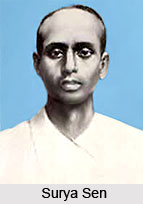 The Indian Republican Army was a revolutionary group in Chittagong included various Indian revolutionaries and Indian freedom fighters who conducted and participated in the well known Chittagong Armoury Raid Case in the year 1930. The armoury raid in Chittagong was one of the most astounding and brave revolutionary endeavours in the history of the Indian freedom struggle that was devised by the youths of the region. The attack was conducted on 18th April 1930 to raid the armoury of police and auxiliary forces from the Chittagong in Bengal province during the rule of the British Empire in India. The Indian Republican Army was led by Masterda Surya Sen and other prominent members included Kalpana Dutta, Pritilata Waddedar, Anand Gupta, Jiban Ghoshal, Ananta Singh, Tarakeswar Dastidar, Harigopal Bal (Tegra), Ardhendu Dastidar, Sasanka Datta, Naresh Roy, Ambika Chakrobarty, Subodh Roy, Nirmal Sen, Lokenath Bal and Ganesh Ghosh.
The Indian Republican Army was a revolutionary group in Chittagong included various Indian revolutionaries and Indian freedom fighters who conducted and participated in the well known Chittagong Armoury Raid Case in the year 1930. The armoury raid in Chittagong was one of the most astounding and brave revolutionary endeavours in the history of the Indian freedom struggle that was devised by the youths of the region. The attack was conducted on 18th April 1930 to raid the armoury of police and auxiliary forces from the Chittagong in Bengal province during the rule of the British Empire in India. The Indian Republican Army was led by Masterda Surya Sen and other prominent members included Kalpana Dutta, Pritilata Waddedar, Anand Gupta, Jiban Ghoshal, Ananta Singh, Tarakeswar Dastidar, Harigopal Bal (Tegra), Ardhendu Dastidar, Sasanka Datta, Naresh Roy, Ambika Chakrobarty, Subodh Roy, Nirmal Sen, Lokenath Bal and Ganesh Ghosh.
The Indian Republican Army was an idyllic combination of planners, executors, thinkers and doers. Moreover, some of the members of the group achieved expertise in the usage of arms and weapons, where as some other members were skilled in political activities.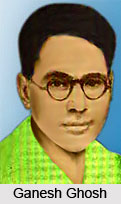
Some of the main members of the Indian Republican Army are mentioned as follow-
Surya Sen
Surya Sen, who was also referred to as Master-Da Surya Sen, was one of the most well known Indian revolutionaries and freedom fighters. He was the chief architect and the leader of the revolutionary group that raided the Chittagong Armoury of Police and Auxiliary Forces. Surya Sen was born on 22 March 1894 in Chittagong. In his later life he became a school teacher of the National school in Nandankanan and later in the Umatara School, Chandanpura. Thus he was addressed as Master-Da, meaning teacher brother. As a revolutionary, Surya Sen led a countrywide non-cooperation movement.
He was arrested in February 1933 and was hanged by the British Government of India on 12 January 1934. A commemorative stamp on Surya Sen was issued by the Indian Government in 1977.
Ganesh Ghosh
Ganesh Ghosh was one of the Bengali Indian revolutionaries and freedom fighters. He was also a member of the Chittagong Jugantar party. Ganesh Ghosh, along with his friend Ananta Singh, participated in the Chittagong Armoury Raid Case in 1930, along with his friend Ananta Singh, under the leadership of Surya Sen. Ganesh Ghosh and Ananta Singh were the military intelligence behind the preparation of the Chittagong uprising. He guided the young recruits in the Indian Republican Army in the military drills. During the raid, Ganesh and Ananta opted to be in the same group, so that they could sacrifice their lives together.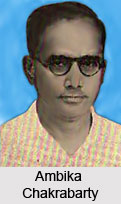
Ganesh Ghosh was exiled to the Cellular Jail in Port Blair after the trial in the year 1932. He was later released in the year 1946 and joined the Communist Party of India.
Lokenath Bal
Lokenath Bal or Lokenath Baul, participated as a member of the armed revolution that was led by Master-Da Surya Sen. He was a part of the Indian Republican Army that carried out the Chittagong armoury raid case 18 April 1930. He was a tall, brawny individual with a rather fair skin tone and was mistaken as a British officer during the raid. He joined the revolutionary group after 1922. Lokenath Bal was arrested on September 1st 1930 after a clash with the British police. He was sentenced to transportation for life on 1 March 1932 and was deported to the Cellular Jail in Port Blair. Lokenath Bal was released in the year 1946 and later he joined the Radical Democratic Party.
Ambika Chakrabarty
Ambika Chakrabarty was one of the Bengali Indian revolutionaries and freedom fighters. He was a core member of the Chittagong Armoury Raid Case in the year 1930. He led a group of the revolutionaries to destroy the whole communication system in the region so that the armoury raid in Chittagong could be conducted on 18 April 1930. Chakrabarty was severely injured in the gunfight against the British army in Jalalabad on 22 April 1930, but he managed to escape. Later he was arrested from his hideaway and sentenced to death. But it was later altered to transportation for life to the Cellular Jail in Port Blair.
Ambika Chakrabarty was released in 1946 from the Cellular Jail and eventually joined the Communist Party of India.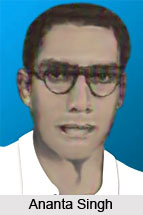
Harigopal Bal
Harigopal Bal, also known as Harigopal Baul, was an integral part of the planning and execution of the Chittagong Armoury Raid Case on 18th April 1930. He escaped after the unsuccessful raid in the armoury of police and auxiliary forces. After a few days, Harigopal Bal was severely injured as he was shot in a gunfight with the British forces at the Jalalabad Hill, near Chittagong. He was the brother of Lokenath Bal. Harigopal Baul died on 22 April 1930.
Ananta Singh
He was one of the prime members of the Indian Republican Army who carried out the raid in the armoury of the British Police and Auxiliary Forces in the year 1930. Although his parents migrated from Punjab, Ananta Singh was born in Chittagong. He became a follower of v after he met him while Singh was in the Chittagong Municipal School. After the failure of the Chittagong raid, he escaped to Chandernagore, which was still a French territory. But after knowing that his fellow revolutionaries were tortured in jail, he surrendered to the British police in Calcutta (now Kolkata) on 28 June 1930. After the trial, Ananta Singh was sentenced to transportation for life and moved to the Cellular Jail, Port Blair.
Nirmal Chandra Sen
Nirmal Chandra Sen was an influential member of the Indian Republican Army from the year 1918. He was also the person who provided the weapons, arms and ammunitions to the group for the execution of the Chittagong Armoury Raid on 18th April 1930. Nirmal Sen was a tall, well built and broad shouldered man. He was frequently mistaken for Surya Sen, when both of them took shelter underground. Nirmal Chandra had widespread contacts in Burma and far east. He often managed to smuggle and secure weapons and ammunitions to Chittagong from across the border. Nirmal Chandra Sen was arrested in July 1926 while he was on a journey to Chittagong. Nirmal Sen acted as the defence minister of the Chittagong revolutionary group.
Kalpana Datta
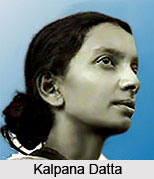 Kalpana Datta, who later became Kalpana Joshi, was one of the central members of the armed revolution movement which was led by Master-Da Surya Sen and supported by Ananta Singh, Harigopal Bal. Ambika Chakrobarty, Subodh Roy, Nirmal Sen, Lokenath Bal, Ganesh Ghosh, Anand Gupta and others. They formed the Indian Republican Army who conducted the Chittagong armoury raid case. She, along with Pritilata Waddedar, was entrusted by Surya Sen to assault the European Club in Chittagong. But while carrying out a secret survey of the region, she was arrested in September, 1931. After her release, Kalpana Datta went underground. Later she was married to Puran Chand Joshi and joined the Communist Party of India.
Kalpana Datta, who later became Kalpana Joshi, was one of the central members of the armed revolution movement which was led by Master-Da Surya Sen and supported by Ananta Singh, Harigopal Bal. Ambika Chakrobarty, Subodh Roy, Nirmal Sen, Lokenath Bal, Ganesh Ghosh, Anand Gupta and others. They formed the Indian Republican Army who conducted the Chittagong armoury raid case. She, along with Pritilata Waddedar, was entrusted by Surya Sen to assault the European Club in Chittagong. But while carrying out a secret survey of the region, she was arrested in September, 1931. After her release, Kalpana Datta went underground. Later she was married to Puran Chand Joshi and joined the Communist Party of India.
Subodh Roy
He was one of the youngest members of the Indian Republican Army that was led by Surya Sen. He actively participated in the Chittagong armoury raid when he was merely 14 years old, along with the other Indian revolutionaries on 18th April 1930. After the failure of the mission, Subodh Roy was arrested by the British police. After his trial in 1934, Roy was exiled to the Cellular Jail in Port Blair.
Apart from the above mentioned members of the Indian Republican Army, there were several other revolutionaries who participated and supported Master-Da Surya Sen and his team in order to carry out the Chittagong Armoury Raid. The group also recruited several teenagers who were oppressed by the British Police and decided to join the Indian freedom struggle.



















